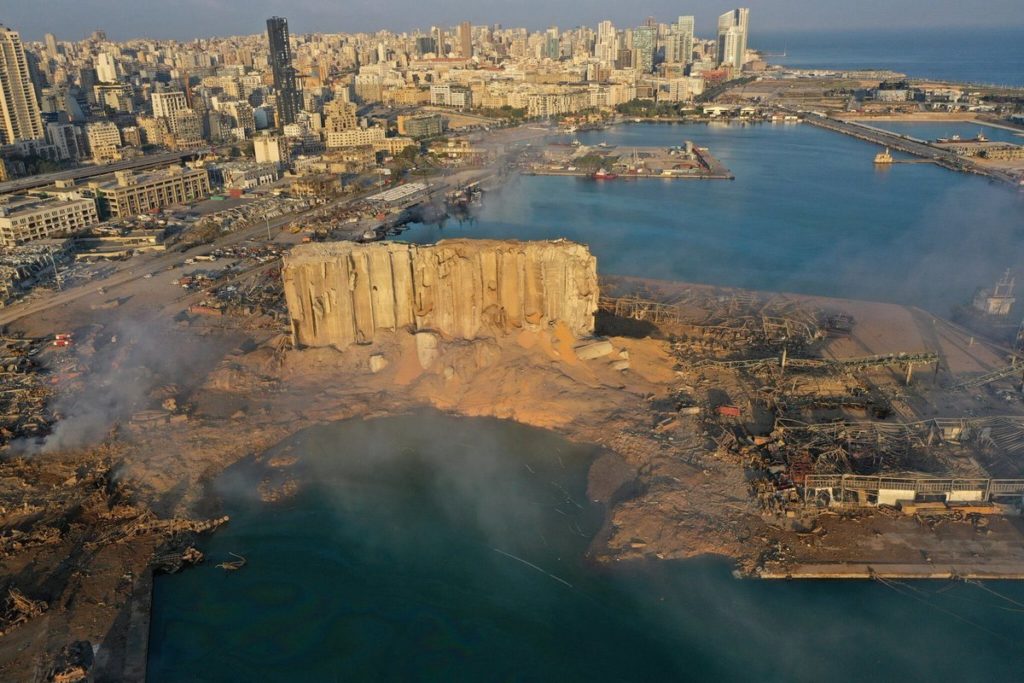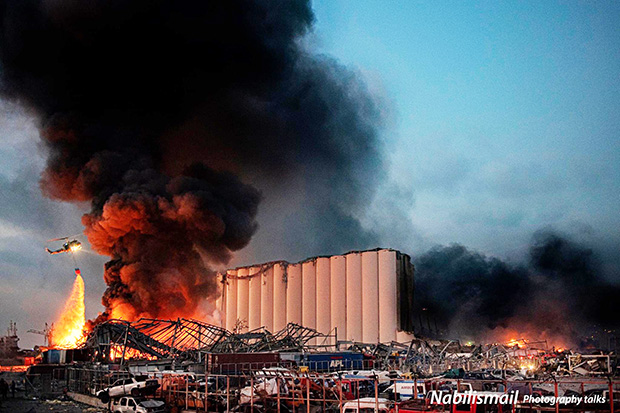
Aerial view of the aftermath of the port explosion showing grain silos still standing next to unusually large crater (Image: CNW@Twitter)
- Lebanese Red Cross says more than 100 people are dead and thousands are injured from the explosion
- Health minister appeals for intl assistance
- Medical supplies stored at a warehouse close to the Beirut port have been destroyed
- Up to 300,000 could be made homeless by the disaster
- Lebanon’s prime minister cites ammonium nitrate as the likely cause
- High Defense Council declares a two-week state of emergency
- Secretary-general of the Kataeb Party Nizar Najarian reportedly killed
- Lebanon’s internal security chief says the blast was in a port area with highly explosive material
- Explosion heard from 150 miles (approx. 240 kilometres) away
BEIRUT – Yesterday, an immense explosion ripped through Lebanon’s capital of Beirut, emanating from the city’s busy port situated right next to the city centre.
According to an official of the Lebanese Prime Minister Hassan Diab, the Beirut explosions were caused by an estimated 2,750 tons of Ammonium Nitrate which was apparently left unsecured for 6 years in a warehouse.
The government vows to punish any officials shown to be negligent in this unprecedented incident which has now claimed the lives of at least 100 residents and injured a further 4,000.
Death tolls could rise sharply once rescue crews are able to search the port area which has been completely leveled as a result of the blast waves.
Windows and doors across the city were blown-in, and blast tremors could be felt as far away as Cyprus.

(Image Source: Twitter)
The area’s hospitals are reportedly overwhelmed as a result of the blast, and medical supplies are in short supply because of stock which was stored at warehouses close to the devastated port area.
Red Cross is said to be coordinating with the ministry for health to allow for morgues to take victims due to the fact that hospitals are overwhelmed.
Blast damage is reported to have extended over half of the city.
BREAKING: Massive explosion in Beirut. Footage from the daily star office now in Lebanon pic.twitter.com/2uBsKP5wCH
— Ghada Alsharif | غادة الشريف (@GhadaaSharif) August 4, 2020
“It’s a catastrophe inside. There are corpses on the ground. Ambulances are still lifting the dead,” said one Lebanese soldier to AFP.
“It was like an atomic bomb,” remarked another resident who lived near the port.
The PM has announced three days of national mourning, and two week “state of emergency” has been declared for Beirut.
City Governor Marwan Abboud says that 10 members of the Fire Brigade are dead. Officials have given the Higher Defense Council 5 days to conduct the investigation.
Initial reports had suggested that the explosion was due to a ‘fireworks depot’ which had caught fire, but subsequent reporting has identified Ammonium Nitrate is the primary accelerent for the blast.
You can't help but look at this incredible explosion in downtown #Beirut #Lebanon and think that there might actually be something more than just crates of fireworks igniting this ferocious wave. Look at this… pic.twitter.com/uS8ErZbzij
— Patrick Henningsen (@21WIRE) August 4, 2020
Call for Evacuation
Lebanon’s health minister has issued an advisory notice for residents to leave the city if they can, due to the possible toxic poisoning and hazardous materials present in the air from the explosion. Officials are warning that these may have long-term deadly effects on the peoples health.
The chemical material in question, an organophosphate known as Ammonium Nitrate, is a common industrial chemical used for for fertiliser, and is also used as an ingredient for explosives, although it is not explosive on its own. On its own, it can only ignite under very specific conditions.
The compound was a catalyst for the Texas fertiliser plant explosion in 2013, and a chemical plant blast in Toulouse, France in 2001, and was also a component in the bomb used in the suspicious 1995 Oklahoma City Bombing.
Beirut governor Marwan Abboud to @AFP:
– Up to 300,000 left homeless by Beirut blast: governor
– Cost of damage from blast tops $3 bn: governor
– Damage extends over half of city: governor#LebanonExplosion #BeirutBlast pic.twitter.com/MyeHbh0kDn— AFP Beirut (@AFP_Beirut) August 5, 2020
UK Telegraph reports…
It is not explosive on its own, but as an oxidiser it can suck oxygen into a fire.
However, Gabriel da Silva, a senior lecturer in chemical engineering at the University of Melbourne, said it ignites only under the right circumstances.
“You need extreme circumstances to set off an explosion,” he told The Guardian.
Ammonium nitrate can actually smother a fire, but if the chemical itself is tainted or contaminated, for example with oil, it becomes explosive. “I think that’s what’s happened here,” said da Silva.
The chemical in the air should disappear quickly but pollutants can have long-term effects, he said.
————————
Numerous key buildings and venues have been wrecked, including the Forum de Beyrouth exhibition hall, as well as offices, shops, bars and restaurants located in nearby Gemmayzeh and Riad el Solh districts.
#Beirut neighborhood Gemmayze – one of the hardest hit by the blast pic.twitter.com/mWbz8YcZ9Y
— Zeina Khodr (@ZeinakhodrAljaz) August 5, 2020
The incident is certain to further devastate Lebanon’s already flagging tourist industry as well as cripple its import and export capability.
The country was already reeling from a currency collapse, spiraling inflation of basic goods, and unlawful US economic sanctions, in addition to economic devastation brought on by Coronavirus lockdowns, and many believe that this incredible disaster will further plunge the country into a long-term economic depression.
Is the US going to lift sanctions on Lebanon now? #BeirutBlast #BeirutExplosion pic.twitter.com/2a1zc5uSDu
— Syrian Girl (@Partisangirl) August 5, 2020
STAY TUNED FOR MORE DETAILS.
READ MORE LEBANON NEWS AT: 21st Century Wire Lebanon Files
SUPPORT OUR INDEPENDENT MEDIA PLATFORM – BECOME A MEMBER @21WIRE.TV














